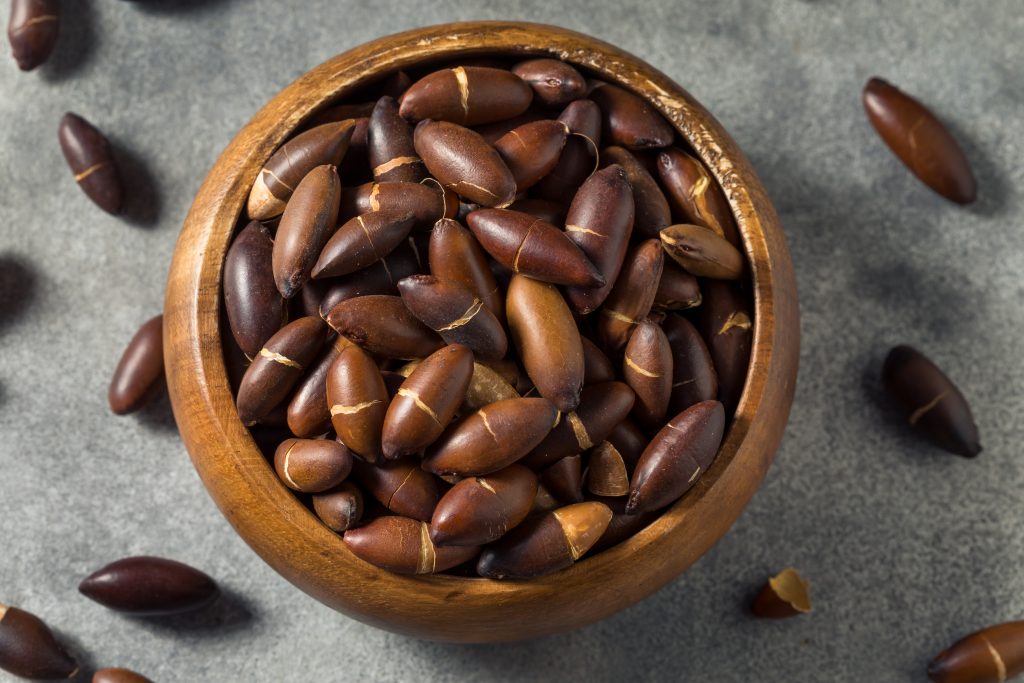Health Benefits of Baruka (Baru) Nuts
- BARE Creations
- August 15, 2022
- 7:35 pm
- No Comments

Grown in the Brazilian savanna, Baru nuts are a member of the legume family. They tough outer shell which is inside a fleshy fruit. They taste like a combination of a cashew and peanut and are a nutritional powerhouse. For the same portion, baru nuts are lower in calories and total fat than other familiar nuts (i.e. walnuts, almonds, cashews) and higher in protein, carbohydrates and fiber. Three tablespoons of roasted baru nuts provides 155 calories, 8 grams of fat, 1 gram of saturated fat, 7 grams of protein, and 14 grams of total carbs.
They’re an excellent source of fiber and vitamin E providing 32% of the dairy recommended amount of both. They’re also a good source of magnesium, potassium, iron, and zinc. They are also brimming with antioxidants. They are lower in calories and fat, higher in protein, and contain more fiber, iron, zinc, potassium, and vitamin E. Considering how nutritious they are, maybe we should try a new formulation with these powerhouse nuts in our white chocolate green tea blend?
Baru nuts are not only nutritious and delicious but environmentally friendly; they have a low water footprint and as the demand for these nuts increases, less trees are being cut down in the area where they are grown which is very important for the ecosystem.
Nutrition Facts
This information is for a 30g (1.1 oz portion) of roasted, unsalted baru nuts:
- Calories: 140
- Fat: 10g
- Sodium: 0mg
- Carbohydrates: 12g
- Fiber: 5g
- Sugars: <1g
- Protein: 6g
- Magnesium: 66mg
- Zinc: 1.2mg
Carbs
Baru Nuts contain 12 grams carbohydrates per 30-gram portion (about 1ounce) or 3 tablespoons. Of these carbohydrates, up to half may be from fiber. They contain more fiber than any other nut.
Fats
There are 10 grams of total fat per 30-gram portion and only 1–2g of saturated fat. The majority of fat includes a combination of healthy mono- and polyunsaturated fat.
Protein
Baru nuts contain 6 grams protein per 30-gram serving which is comparable to peanuts and much higher than all tree nuts. This high protein content is attributed to it being a member of the legume family, just like peanuts.
Vitamins and Minerals
Similar to other nuts, baru nuts are a source of a variety of micronutrients including iron, zinc, magnesium, potassium, calcium and vitamin E. Many of these mineral levels are significantly higher than other commonly consumed nuts with the exception of potassium which is comparable to pistachios and vitamin E which is comparable to almonds.
One serving of baru nuts provides approximately 6% the daily value of potassium and iron, 10% the daily value of zinc, almost 15% the daily value of magnesium, and about 30% of the daily value of vitamin E.
Health Benefits
Supports Heart Health
A randomized placebo-controlled trial examined the benefit of daily consumption of baru nuts among overweight and obese women. The results showed that adding 20g (less than 1 ounce) of baru nuts to their diets over 2 months, increased HDL cholesterol (good cholesterol). This is likely related to a combination of the high content of mono-and polyunsaturated fats, fiber, and antioxidant compounds in the nuts.
Assists with Weight Management
The same study also measured abdominal fat and waist circumference, both of which were significantly reduced after two months of daily baru nut consumption.
Boosts Immune System
Baru nuts are particularly high in antioxidants, measured by a high ORAC (oxygen radical absorbance capacity) score of approximately 6,000 per serving. An ORAC score is a method of measuring the antioxidant capability of different foods. For frame of reference, researchers state that having a daily intake of 3,000-5,000 ORAC units per day is beneficial for health. While ORAC score alone does not determine the health benefits of a food, it does indicate the potential for baru nuts to help fight free radicals in the body.
 FREE SHIPPING WITHIN CANADA ON ORDERS OVER $35
FREE SHIPPING WITHIN CANADA ON ORDERS OVER $35
